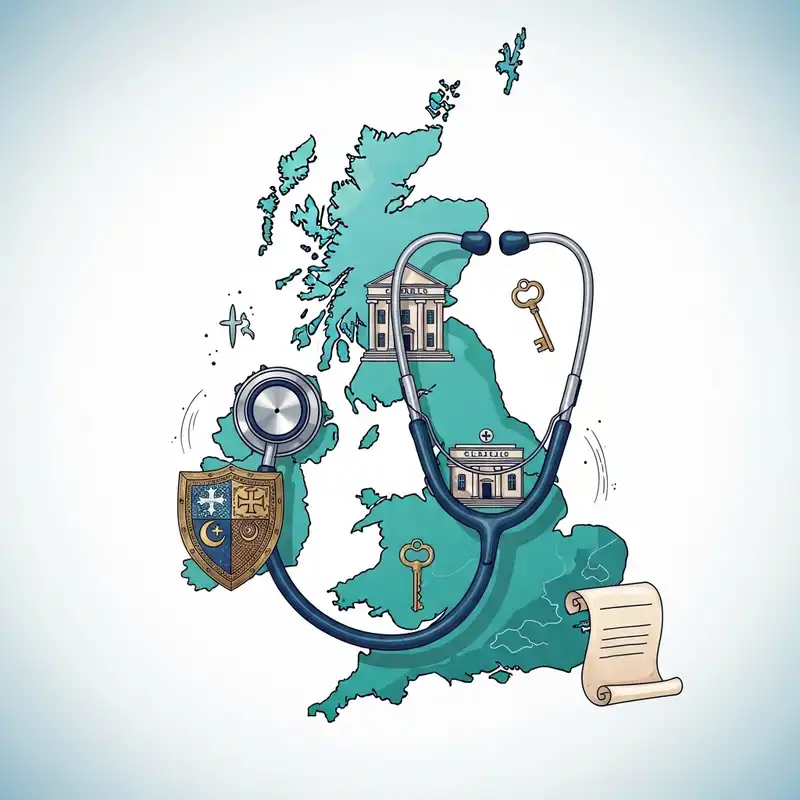TL;DR
We champion the power of a positive mindset. The British 'stiff upper lip', the determination to push through adversity, and the sheer grit to face challenges head-on are qualities to be admired. But in the face of a life-altering health crisis, mindset alone is not a strategy.
Key takeaways
- Income Loss: You may be unable to work for months, or even years. Statutory Sick Pay (SSP) provides a minimal safety net, but at £116.75 per week (2024/25 rate), it's rarely enough to cover a household's essential outgoings.
- Unexpected Costs: A serious illness brings a host of new expenses. These can range from travel to specialist hospitals, home modifications, private consultations, or even costly medications not yet available on the NHS.
- Career Disruption: A prolonged absence can impact your career trajectory. For the self-employed, it can mean a complete halt to business operations and income.
- Impact on Family: A partner may need to reduce their working hours or stop working entirely to become a caregiver, further straining household finances.
- What It Covers: The 'big three' – cancer, heart attack, and stroke – are almost always included. However, comprehensive policies can cover over 100 conditions, including multiple sclerosis, major organ transplant, and permanent paralysis. The quality of a policy is often determined by the breadth and clarity of these definitions.
Beyond Grit the Resilient Life Blueprint
We champion the power of a positive mindset. The British 'stiff upper lip', the determination to push through adversity, and the sheer grit to face challenges head-on are qualities to be admired. But in the face of a life-altering health crisis, mindset alone is not a strategy. It's a component, but it isn't the foundation.
The stark projection from Cancer Research UK that one in two people will be diagnosed with cancer in their lifetime is not a scare tactic; it is a statistical reality that demands a new kind of preparedness. True resilience, the kind that allows you not just to survive but to thrive through life's most profound challenges, is built on a blueprint of practical, robust financial protection. This is the bedrock that allows you the space, time, and resources to focus purely on recovery, without the corrosive anxiety of financial ruin.
This guide is your blueprint. It moves beyond inspirational quotes and into the tangible, strategic actions you can take to build a fortress of financial security for yourself, your family, and your business.
The New Reality: Why 'Mind Over Matter' Is Only Half the Equation
When a serious illness strikes, it doesn't just attack your body; it launches a multi-front assault on your entire life. There's the physical toll, the emotional upheaval, and the often-underestimated financial shockwave.
The modern financial landscape leaves little room for error. With rising living costs and many families relying on two incomes to manage mortgages and daily expenses, the loss of even one salary can be catastrophic. Consider the cascading effects:
- Income Loss: You may be unable to work for months, or even years. Statutory Sick Pay (SSP) provides a minimal safety net, but at £116.75 per week (2024/25 rate), it's rarely enough to cover a household's essential outgoings.
- Unexpected Costs: A serious illness brings a host of new expenses. These can range from travel to specialist hospitals, home modifications, private consultations, or even costly medications not yet available on the NHS.
- Career Disruption: A prolonged absence can impact your career trajectory. For the self-employed, it can mean a complete halt to business operations and income.
- Impact on Family: A partner may need to reduce their working hours or stop working entirely to become a caregiver, further straining household finances.
This is where the concept of financial resilience becomes critical. It's the ability of your financial plan to absorb a significant shock without collapsing. It’s the difference between weathering the storm and being swept away by it. Relying solely on grit is like navigating a hurricane in a rowing boat. A resilient financial plan is your all-weather vessel, designed to see you safely to shore.
Building Your Financial Fortress: The Core Pillars of Protection
Think of building your financial resilience like constructing a house. You wouldn't start with the decor; you'd begin with deep, solid foundations. In financial planning, these foundations are your protection policies. They are not a 'nice-to-have'; they are the essential structures that support everything else.
Your personal "Resilient Life Blueprint" should be built on three core pillars:
- Income Security: Ensuring money still comes in when you can't earn it.
- Capital Security: Providing a lump sum of cash to deal with major life events like a serious illness or death.
- Health Security: Giving you fast access to the best possible medical care.
Let's explore the specific tools you can use to construct each of these pillars, creating a comprehensive shield against uncertainty.
Pillar 1: Protecting Your Income – The Lifeline When You Can't Work
Your ability to earn an income is your most valuable asset. Without it, mortgages go unpaid, bills pile up, and dreams are put on hold. Protecting it is paramount.
Income Protection (IP)
Often described by financial experts as the one policy every working adult should consider, Income Protection is your financial stand-in. It pays out a regular, tax-free monthly income if you are unable to work due to any illness or injury.
- Who Needs It? Anyone who relies on their salary or earnings. It is especially critical for the self-employed and freelancers who have no access to employer sick pay schemes.
- Key Features:
- Benefit Amount: You can typically cover 50-70% of your gross income.
- Deferred Period: This is the waiting period before the policy starts paying out, chosen by you. It can range from 4 weeks to 12 months. Aligning this with your employer's sick pay period or your emergency savings is a smart strategy.
- Length of Claim: This is the crucial part. A true Income Protection policy will pay out for as long as you are unable to work, right up until retirement age if necessary. This protects you from long-term or recurring conditions.
To understand its value, let's compare it to the state provision.
| Feature | Income Protection (Typical Policy) | Statutory Sick Pay (SSP) |
|---|---|---|
| Max Weekly Payout | £1,000s (based on your salary) | £116.75 (fixed rate for 2024/25) |
| Payment Duration | Until you recover or reach retirement | Maximum of 28 weeks |
| Coverage | Covers most illnesses and injuries | Minimum earnings threshold applies |
| Who Gets It? | Policyholders who meet claim criteria | Eligible employees only (not self-employed) |
Personal Sick Pay Insurance
For some professions, the risk of being unable to work is heightened, not just by serious illness, but by more common injuries. Personal Sick Pay is a form of short-term income protection designed for this reality.
It's particularly vital for:
- Tradespeople (Electricians, Plumbers, Builders): A broken arm or a back injury, while not 'critically' ill, can completely prevent you from doing your job for weeks or months.
- Healthcare Professionals (Nurses, Physiotherapists): These physically demanding roles carry a high risk of musculoskeletal injury.
- Freelance Creatives (Photographers, Dancers): Your physical ability is directly tied to your income.
Personal Sick Pay policies typically pay out for 1 or 2 years, offering a crucial bridge to get you back on your feet without draining your savings.
Executive Income Protection: A Smart Choice for Company Directors
If you're a company director, Executive Income Protection is one of the most tax-efficient ways to protect your personal income.
- How it Works: The company pays the premiums for the policy, which covers the director's income.
- The Benefit: Because the premium is paid by the business, it's typically treated as an allowable business expense. This means the company can offset the cost against its corporation tax bill. The benefit is paid to the company, which then distributes it to the director via PAYE. This ensures the director's financial stability and provides continuity for the business.
Pillar 2: Facing a Health Crisis with Capital – Critical Illness & Life Cover
While income protection replaces your monthly earnings, some events require a significant injection of capital. A serious illness diagnosis can bring immediate, large-scale costs, and it's here that a lump-sum payment can be life-changing.
Critical Illness Cover (CIC)
Critical Illness Cover pays out a tax-free lump sum if you are diagnosed with one of a list of specific, serious medical conditions defined in the policy.
- What It Covers: The 'big three' – cancer, heart attack, and stroke – are almost always included. However, comprehensive policies can cover over 100 conditions, including multiple sclerosis, major organ transplant, and permanent paralysis. The quality of a policy is often determined by the breadth and clarity of these definitions.
- How the Payout Helps: The freedom this lump sum provides is immense. It can be used for anything:
- Pay off your mortgage or other debts, removing a huge financial pressure.
- Fund private medical treatment or specialist therapies.
- Adapt your home for new mobility needs.
- Allow a partner to take time off work to care for you.
- Simply provide a financial cushion, allowing you to recover without worry.
When considering CIC, it's vital to look beyond the headline price. The number of conditions covered and the quality of the definitions are what truly matter.
| Policy Type | Conditions Covered (Approximate) | Best For |
|---|---|---|
| Standard CIC | 30-50 | Providing a core safety net against the most common major illnesses. |
| Enhanced CIC | 80-150+ | Comprehensive protection, including less common and early-stage conditions. |
| Life & CIC Combined | Varies | A cost-effective way to secure both types of lump-sum cover in one policy. |
A broker service like WeCovr is invaluable here. We help you compare not just the price but the intricate details of the conditions covered by every major UK insurer, ensuring you get the policy that offers the most meaningful protection for you.
Securing Your Family's Future: Life Protection
Life Protection, or Term Life Insurance, is the ultimate expression of care for those you leave behind. It pays out a lump sum upon your death during the policy term.
- Level Term Assurance: Pays out a fixed lump sum. Ideal for providing a family inheritance or covering large, interest-only mortgages.
- Decreasing Term Assurance: The payout amount reduces over time, usually in line with a repayment mortgage. It's a cost-effective way to ensure your home is secure for your family.
Family Income Benefit (FIB): A Smarter Way to Protect
For many families, especially those with young children, a huge lump sum can be daunting to manage. Family Income Benefit offers an elegant alternative. Instead of a single payout, it provides a regular, tax-free monthly or annual income from the time of claim until the end of the policy term.
Example: A 35-year-old takes out a 20-year FIB policy. If they were to pass away 5 years later, the policy would pay a regular income to their family for the remaining 15 years, perfectly timed to cover school years and university. This mirrors a lost salary, making budgeting simple and secure for the surviving partner.
Gifting with Confidence: Gift Inter Vivos Insurance
For those in the fortunate position of planning their estate, Inheritance Tax (IHT) is a key consideration. When you gift a significant asset (money or property), it may still be considered part of your estate for IHT purposes if you pass away within 7 years. This is known as the "7-year rule".
A Gift Inter Vivos policy is a specialised life insurance plan designed to cover this potential tax liability. It pays out a lump sum on death within the 7-year period, allowing your beneficiaries to receive the full value of your gift without an unexpected tax bill. It's a crucial tool for effective and secure estate planning.
The Business Resilience Blueprint: Protecting Your Enterprise
Your personal financial resilience is intrinsically linked to the health of your business, especially if you are a director or owner. Protecting the business is another way of protecting yourself and your family.
Key Person Insurance
Who is the one person your business couldn't function without? The star salesperson, the technical genius, the visionary founder? Key Person Insurance protects the business against the financial fallout of losing that individual to death or critical illness.
The policy is owned and paid for by the business, and the payout goes directly to the business. This cash injection can be used to:
- Cover the costs of recruiting and training a replacement.
- Repay business loans that the key person may have guaranteed.
- Compensate for a drop in profits or loss of client confidence during the transition.
- Reassure investors, lenders, and employees that the business has a solid contingency plan.
Shareholder & Partnership Protection
If you co-own a business, what happens if one of you dies or is diagnosed with a critical illness? The surviving owners could suddenly find themselves in business with the deceased's spouse or family, who may have no interest or skill in running the company.
Shareholder or Partnership Protection provides a lump sum to the surviving owners, giving them the capital required to buy the outgoing partner's shares from their estate. This is usually set up alongside a legal agreement, ensuring a smooth and fair transition that protects the future of the business for everyone involved.
Pillar 3: The Health Enabler – Comprehensive Private Medical Insurance (PMI)
While the NHS is a national treasure, it is under unprecedented strain. As of early 2025, waiting lists for routine treatments remain at historically high levels, with millions of people waiting for care. This is where Private Medical Insurance (PMI) becomes a powerful enabler of resilience.
PMI is not about replacing the NHS; it's about working in partnership with it to give you more control, choice, and speed.
Key Benefits of PMI:
- Bypass Waiting Lists: This is perhaps the most significant benefit. Gaining immediate access to a consultant and scheduling diagnostics and treatment within days or weeks, rather than months or years, can have a profound impact on your outcome and quality of life.
- Choice and Control: You can choose your specialist, your hospital, and the timing of your treatment, fitting it around your life and work commitments.
- Access to Specialist Care: PMI policies often provide access to the latest generation of drugs, treatments, and therapies that may not yet be approved for widespread NHS use due to cost.
- Comfort and Privacy: Recovering in a private room with more flexible visiting hours can significantly reduce stress and aid recovery.
| Feature | NHS | Private Medical Insurance (PMI) |
|---|---|---|
| Access to Specialists | Via GP referral, often with long waits | Fast access, often with choice of consultant |
| Waiting Times for Treatment | Can be many months, even over a year | Typically days or weeks |
| Choice of Hospital | Limited to local NHS Trust | Extensive list of high-quality private hospitals nationwide |
| Access to New Drugs | Governed by NICE guidelines and budgets | Often provides access to breakthrough cancer drugs & treatments |
| Accommodation | Usually a shared ward | Private en-suite room |
A health crisis is a full-time job. PMI takes the administrative and logistical burden off your shoulders, freeing you to focus 100% of your energy on getting better.
Beyond Insurance: Cultivating Everyday Resilience
While insurance forms the structural foundation of your resilient life, your daily habits are the materials that strengthen that structure. A holistic approach to wellbeing can reduce your risk of illness and improve your ability to recover if it does strike.
- Nourishment: A balanced diet rich in fruits, vegetables, and whole grains is scientifically linked to a lower risk of many chronic diseases, including certain cancers and heart disease. Small, consistent changes have a huge cumulative effect.
- Movement: The NHS recommends at least 150 minutes of moderate-intensity activity a week. This doesn't have to mean the gym. Brisk walking, cycling, and even vigorous gardening all count. Regular exercise is a powerful tool for both physical and mental health.
- Sleep: Quality sleep is non-negotiable for a healthy immune system and mental clarity. Aim for 7-9 hours per night and practice good sleep hygiene: reduce screen time before bed and create a calm, dark environment.
- Mental Wellbeing: Chronic stress weakens the body. Practices like mindfulness, meditation, or simply spending time in nature can have a profound impact on your ability to cope with life's pressures.
At WeCovr, we're passionate about supporting our clients' holistic health. That's why, in addition to finding you the right financial protection, we provide our customers with complimentary access to our proprietary AI-powered calorie tracking app, CalorieHero. It’s a simple, effective tool to help you stay on top of your nutrition and fitness goals, reinforcing your resilience from the inside out.
Putting It All Together: A Resilient Life Blueprint in Action
Let's see how this works for "Alex," a 42-year-old self-employed IT contractor, married with one child and a £300,000 mortgage. (illustrative estimate)
Alex's Resilient Life Blueprint:
- Income Protection (illustrative): Alex protects 60% of his £70,000 annual income. With a 3-month deferred period, he knows that if an injury or illness stops him from working, his family's core finances are secure after his emergency fund runs out.
- Life & Critical Illness Cover (illustrative): He takes out a decreasing term policy for £300,000, linked to his mortgage. This ensures that if he dies or is diagnosed with a critical illness, his family's home is paid off, removing their biggest financial burden.
- Family Income Benefit (illustrative): To cover day-to-day costs, he adds a small FIB policy set to pay out £1,500 a month until his child turns 21. This provides certainty for his wife to manage school fees, clubs, and bills.
- Private Medical Insurance: A comprehensive PMI policy gives him peace of mind that if he develops a condition, he can bypass waiting lists and get the best care immediately, minimising his time away from his business and family.
Alex's blueprint doesn't prevent a crisis from happening, but it completely changes how he and his family would experience it. It replaces financial panic with financial control.
Conclusion: From Anxious to Empowered
The world is an uncertain place. Projections about our future health are sobering. But we are not powerless. True, unshakeable resilience is not about ignoring these realities; it's about facing them with a proactive, intelligent plan.
It's about making a conscious choice to build a financial fortress that will stand strong when the storms of life hit. This isn't about being pessimistic; it's about being pragmatic. It's the ultimate act of optimism—freeing yourself and your loved ones from financial fear, allowing you to pursue your goals, passions, and purpose with confidence and peace of mind.
Navigating the world of protection insurance can be complex. The definitions, the options, the providers—it can feel overwhelming. That is where we can help. At WeCovr, our expertise is in simplifying this process. We listen to your unique circumstances and help you build a bespoke Resilient Life Blueprint, comparing plans from all the UK's leading insurers to find the perfect combination of value and quality.
Don't leave your future to chance and grit alone. Take control. Build your blueprint. Create a resilient life.
Is protection insurance like life or critical illness cover expensive?
Do I really need income protection if I have savings?
What is the difference between Critical Illness Cover and Private Medical Insurance?
I'm self-employed. What cover is most important for me?
How does an expert insurance broker like WeCovr help?
• Understand your personal, family, and business needs.
• Scan the entire market of UK insurers to find the most suitable policies.
• Analyse the small print and policy definitions, not just the price, to ensure the cover is robust.
• Help you complete the application process and place your policy 'in trust' to ensure it's paid out efficiently and outside of your estate for inheritance tax purposes.
This saves you time, money, and ensures you get the right protection without any gaps.
Can I get cover if I have a pre-existing medical condition?
Sources
- Office for National Statistics (ONS): Mortality and population data.
- Association of British Insurers (ABI): Life and protection market publications.
- MoneyHelper (MaPS): Consumer guidance on life insurance.
- NHS: Health information and screening guidance.

































